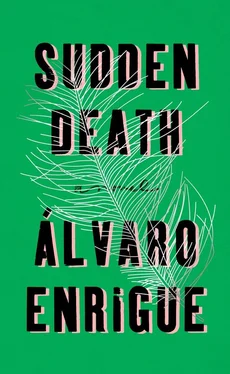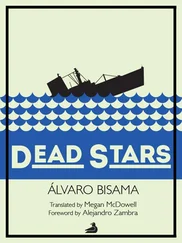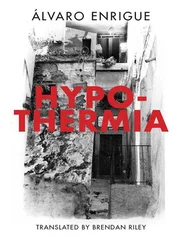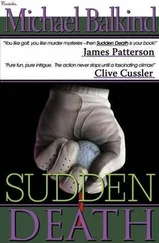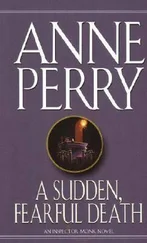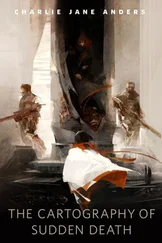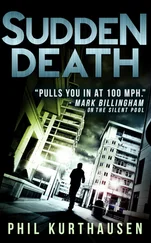The ball couldn’t be sent to Rome as it was, so he had a little chest made from sheets of mother-of-pearl riveted with gold, which in addition to matching the regal sumptuousness of its contents had the advantage of being a lengthy job for the goldsmith. This allowed the minister — who was a devotee of the glory of France but also (though always secondarily) of the delectable sexual practices of low-ranking and high-breasted courtesans — to embark on a bedroom game or two with the ball, beneath whose leather stays beat Anne Boleyn’s incendiary braids.

Catalina Enríquez de Ribera y Cortés and Pedro Téllez Girón had not just a marriage but a powerful business partnership in which each provided the other with what was needed to act on a grudge. He brought new visibility to the gray house of Alcalá with his political savvy and his proximity to the king; she contributed money and the memory of the wiles of her grandfather, who had gone away and won what he believed he deserved.
When Osuna learned that a detail of bailiffs was being sent from Madrid to arrest him for abusing the generosity of the king with his trip to Italy, he set off for Ostend. He left for Flanders by night, accompanied by a single servant. There he joined the royal regiments like any other soldier until he was distinguished by his valor in combat.
The house of Osuna had no precedent for this: fleeing the king by taking up arms to defend the king; fighting bitterly to reclaim a territory in order to win a royal pardon; forcing the monarch and all his judges and bailiffs to pay obeisance. The only thing he carried with him on the jaunt was Cortés’s sword, which Catalina took down from the wall of the garden room and gave to him before he set off on the road like a bandit.
There were likely few husbands in Spain at the end of the sixteenth century who were as unfaithful as Osuna, and it’s interesting to note that each time the young duke was put under house arrest for reasons to do with his capacity for drink and the ubiquity of his member, Catalina had to embrace the sentence and serve it with him.
Many years later, at the fateful hour of the final and most serious of the duke’s confinements — the one that spelled his end because this time he was accused of lèse-majesté and his enemies at court were infinite — Catalina Enríquez de Ribera y Cortés didn’t hesitate to write a spectacular letter to Philip IV in defense of her husband. Addressing the king with the familiar tú , the duchess reminded him that his Holy Roman Emperor great-grandfather, Charles V, had treated her grandfather Hernán Cortés as wretchedly as he was now treating Osuna. She reminded him that Ostend would have fallen and Spain given way to the Low Countries entirely had it not been for her husband’s defense of the city — which was true, to a certain extent. She pointed out that because her man had fought in the mud to defend the king, Spain had been able to sign a treaty rather than concede defeat.
The letter didn’t sway Philip: the duke died under strict house arrest on September 20, 1624.
The night of November 26, 1599, when Osuna had fled to Flanders, his wife had accompanied him to the door of the Palacio de los Adelantados — where both had hid while the king’s bailiffs called for him at his own palaces. Stay alive, she said before giving him a kiss. She touched his chest. Are you wearing the scapular? He felt it under his shirt. Don’t take it off.
The Banker and the Cardinal

Though Cardinal del Monte was Caravaggio’s official patron in the years when he burst onto the scene of Mannerist painting in order to annihilate it, del Monte wasn’t the primary collector of his paintings. He had the discernment to discover him, but not to understand what he would be capable of once he set about painting with absolute freedom and support, as he did once he had a studio at the Palazzo Madama and enough commissions to unleash his visual experiments. Back then, his brilliantly colored paintings must have looked very strange, with characters from sacred history portrayed as the lowly beings who crowded Rome at the end of the sixteenth century.
The banker Vincenzo Giustiniani, head of the Repostaria Romana and principal financier of the French crown, must have seen Caravaggio’s paintings in the Palazzo Madama’s music salon — he was a neighbor and good friend of Cardinal del Monte — and without ever encroaching on the cardinal’s patronage, he bought up all the works by the artist that were perhaps too scandalous to hang in the house of a prelate. These works — possibly too extreme for del Monte not only to display but even to understand — turned out to be plentiful. At the end of Merisi’s life, the cardinal had eight of his paintings and the banker fifteen.
Caravaggio’s work was just one of the realms in which del Monte and Giustiniani competed for objects that skirted the acceptable in Counter-Reformation Rome. If del Monte bought the second telescope produced for commercial purposes by his protégé Galileo Galilei, it was because Giustiniani had bought the first. At the cardinal’s grand parties, just as at the banker’s more spartan gatherings, the high point was always the moment when someone opened the door to the terrace and invited the guests to see the moon from as close up as the Selenites must have seen it.
Del Monte and Giustiniani couldn’t have been more different. The banker was a married man, terribly bored by the worldly obligations of his work as financier to the pope. When he could, he escaped to the scrubland of Liguria to hunt deer and wild boar. He was long and gaunt, with the kind of sharp face that betrays the true predator. He spoke little and read a great deal. Nothing could have been more unlike the cardinal’s gelatinous exuberance. The two men’s friendship — in addition to being genuine — was a fire-tested bond that made it possible for them to operate comfortably, though because of their French connection they were always in the minority at the Vatican.
Both were lovers of mathematics and sponsors of treatises on the mechanical sciences. Both invested time and money in a novel form of alchemy that didn’t seek the transmutation of metals or the elixir of youth but rather a knowledge of the essential elements of the earth — what we now call inorganic chemistry.
Anyone who believes that earthly objects are all composed of the same group of substances, and that transformations are accomplished only by mechanical means, will naturally perceive the voice of God in the filthy fingernails — nails that are of this world, a part of history — of Caravaggio’s saints and virgins. The voice of a god more brilliant than capricious; a god unlike God, remote and uninterested in revealing himself in miracles beyond combustion or the balance of forces; a true god for everyone: the poor, the wicked, the politicians, the rent boys, and the millionaires.
Caravaggio was to painting what Galilei was to physics: someone who took a second look and said what he was seeing; someone who discovered that forms in space aren’t allegories of anything but themselves, and that’s enough; someone who understood that the true mystery of the forces that control how we inhabit the earth is not how lofty they are, but how elemental. Del Monte and Giustiniani surrendered to Caravaggio. For the banker, it was the paintings; for the cardinal, the man. The two of them lived in palaces that faced each other across the piazza, at the end of which was the church of San Luigi dei Francesi, where Merisi’s first public works of art hang.
Читать дальше
